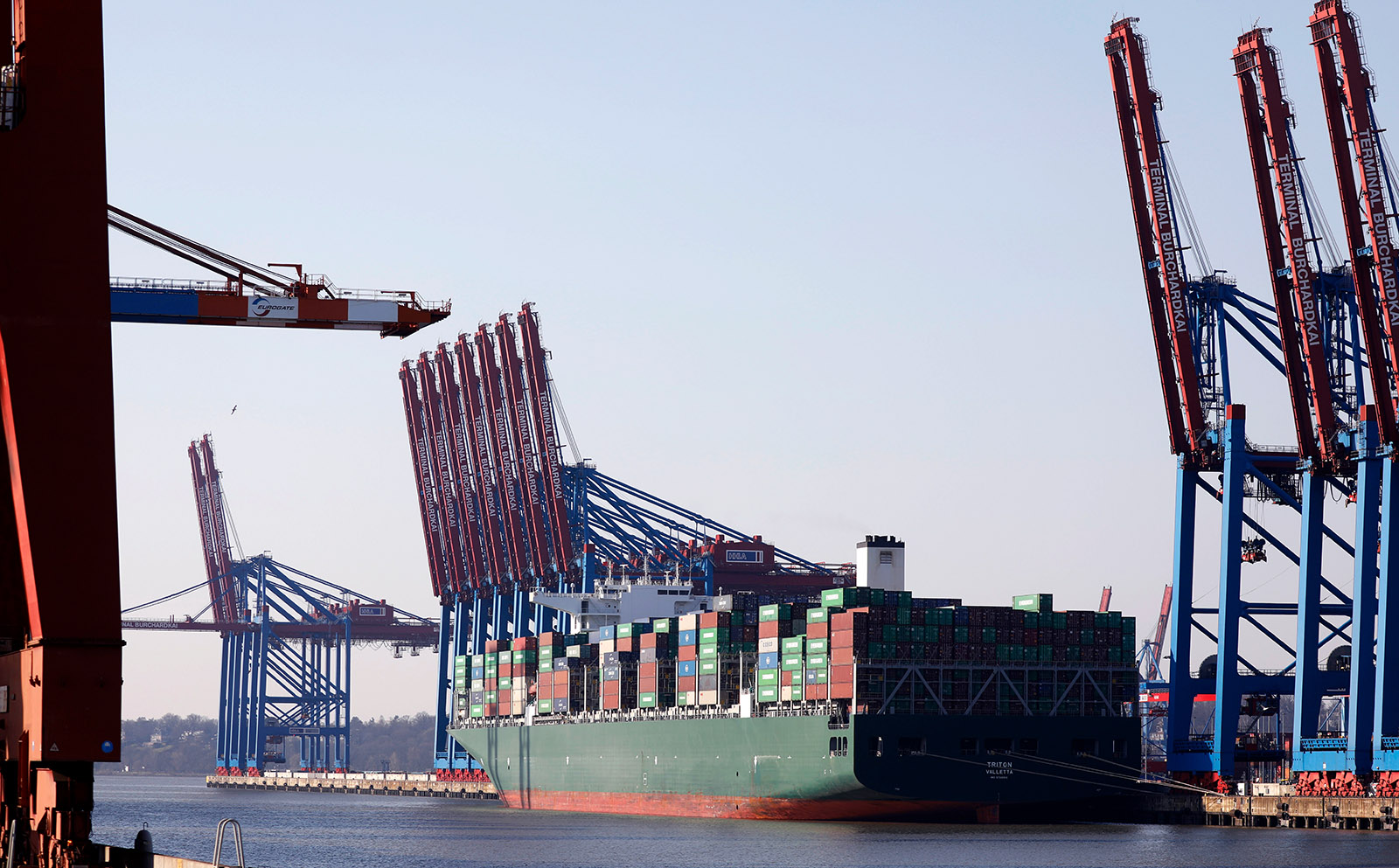The Pandemic is a Top Maritime Industry Issue — But It’s Not the Only One

A container terminal in a harbor in Germany. Because of COVID-19, maritime transport should brace itself for change and prepare to reassess vessel and capacity deployment, shipping network configuration and port development.
Photo: Morris Mac Matzen/AFP via Getty Images
With much of the world’s attention focused on the COVID-19 pandemic, it’s easy to forget that other pressing issues have not gone away. For the maritime industry, the pandemic has exacerbated some risks and had relatively little effect on others, which are two points brought into focus by the Global Maritime Issues Monitor 2020. Based on a survey of maritime industry leaders and bolstered by expert commentary, the report presents a look into the top global issues for the sector in terms of likelihood, impact and preparedness.
This was the third year the Global Maritime Forum — with support from Marsh and the International Union of Marine Insurance — conducted the survey, but the first that asked respondents to consider pandemic risk. Their response was to place pandemics third on the list of 19 issues in terms of potential impact. Not surprisingly, respondents ranked it in last place regarding how prepared the industry is to manage it.
Along with pandemic concerns, survey respondents cited issues related to global economies and geopolitics, the environment, and digitization as being of particular concern. Embedded in these emerging issues are the challenges and opportunities from which the sector will set its course through the pandemic and beyond.
The Pandemic’s Affect Ranges Wide
With the pandemic the dominant global issue since early 2020, the survey asked respondents how they see COVID-19 affecting the likelihood of other issues. The most resounding response related to the impact of a pandemic on a potential global economic crisis: 93% said the pandemic makes such a crisis more likely.
Among the survey’s other pandemic-related results: 73% of respondents think the pandemic makes geopolitical tension more likely, particularly escalation in the conflict between the U.S. and China; 72% think trading patterns are more likely to change; 48% said the pandemic will increase the societal demand for sustainability; 46% said COVID-19 increases the likelihood of governance failure, which we define as the inability of regional or global institutions to resolve issues of economic, geopolitical or environmental importance; and 35% said that the main issue the pandemic made less likely is fuel price increases.
Across the board in the survey results and in comments about the results from an array of external experts, there was a recognition of COVID-19’s deep impact on the maritime industry.
Secretary General Mukhisa Kituyi of the UN Conference on Trade and Development (UNCTAD), summed it up well: “COVID-19 is a litmus test for a globalized and interdependent world economy. Maritime transport should brace itself for change and prepare to reassess vessel and capacity deployment, shipping network configuration and port development. Shipping and ports may also have to rethink their strategies and plans to integrate criteria pertaining to disruption risks and vulnerabilities, as well as related response mechanisms.”
It will also be critical for the industry to consider health impacts as it evaluates its response to COVID-19, particularly issues of physical and mental well-being for the seafarers who form the backbone of shipping. There is a range of workforce issues for the industry to tackle in developing resilience against the next pandemic, including impacts of the disease itself; seafarers being unable to join their families and, in some cases, working on expired contracts; and the possibilities of increasing the amount of remote work done in the sector.
One red flag from the survey results relates to the perceived likelihood of future pandemics. Although respondents ranked a new pandemic as likely to occur, they placed it 10th in likelihood compared to other issues. This ranking in the middle of the pack presents a warning: Once the world deems COVID-19 “done,” organizations cannot afford to ease up on overall pandemic resilience efforts.
The increasing demand from society for sustainability means the maritime sector will face continued scrutiny of its environmental performance.
Economic and Geopolitical Issues Are High on Agendas
Economics and geopolitics will always play an outsize role in the maritime industry, and survey respondents — for the third consecutive year — said a global economic crisis would have the highest impact on the sector over the next 10 years.
Not surprisingly, a shift occurred this year in respondents’ perception of how likely a global economic recession has become — the issue moved from number 10 in likelihood in 2019 to number two this year as 93% of respondents said the pandemic makes such a crisis more likely. Indeed, it is underway. Among the concerns expressed were increased tension between the U.S. and China and more regionalization.
In the open-ended comments section of the survey, many respondents said they expect to see bankruptcies and consolidation increase, along with more scrapping of older ships, and lower rates of new-build orders.
Several experts noted that globalization itself is under threat at this time.
“The maritime shipping industry will need to consider how to optimize their global footprint in this more challenging, fragmented environment,” said Meredith Sumpter, head of research, strategy and operations at Eurasia Group. “This may mean more of a shortening or rationalization of shipping routes than planned to capitalize on the trend toward intra-regional trade.”
Digitization Needs Breakthroughs
Digitization is another area that the pandemic has emphasized as a shortcoming in the maritime industry. Engaging in hindsight, some experts said that if digital technologies had been more widely adopted before the pandemic, they could have improved transparency and traceability in disrupted supply chains and decreased seafarers’ exposure to COVID-19.
Perhaps this line of thinking will spur more action within the industry to make digitization a top agenda item and engage with technological advances, from big data analytics to artificial intelligence to autonomous technology.
Potential benefits include efficiencies in data optimization — including meteorological data, oceanographic data, shipping rates, vessel information — as well as improved risk management, environmental performance and more.
Environmental Issues Remain Top of Mind
The increasing demand from society for sustainability means the maritime sector will face continued scrutiny of its environmental performance. In the 2019 survey, environmental issues — climate change, decarbonization of shipping and new environmental regulation — dominated the results, and they remained a high priority in 2020.
Given its pervasiveness, the pandemic cast a shadow on thinking about these issues, even if it didn’t dominate them. For example, the majority of respondents (57%) said that the pandemic would not have any impact on efforts to decarbonize shipping, which is a cornerstone of the industry response to climate change. In fact, some commentators said they were encouraged that decarbonization efforts and ambitions remain high.
Some of those commenting on the survey results said that as governments roll out stimulus packages in COVID-19’s wake, associated policymaking could include incentives for shippers to decarbonize their fleets. But fortunately, according to Faustine Delasalle, director of the Energy Transition Commission, “weathering the current recession and moving toward decarbonization do not need to be mutually exclusive.”
A version of this piece was originally published in The Marine Insurer.




